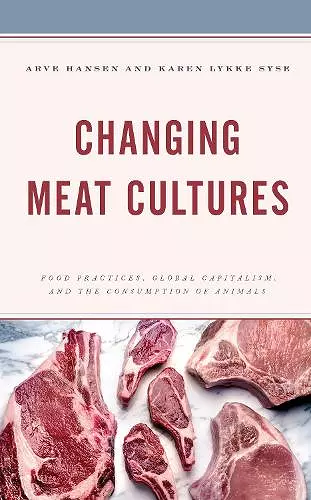Changing Meat Cultures
Food Practices, Global Capitalism, and the Consumption of Animals
Karen Lykke Syse editor Arve Hansen editor
Format:Paperback
Publisher:Bloomsbury Publishing PLC
Published:22nd Aug '23
Currently unavailable, and unfortunately no date known when it will be back
This paperback is available in another edition too:
- Hardback£98.00(9781538142653)

This collection explains changing meat cultures through studies of both everyday food practices and the political economy of industrialized animal husbandry. We do this through case studies from 'affluent' and 'developing' countries. These contributions will shed light on global food connections and show how global, industrialized food and fodder systems have changed the way we relate to animals, their meat, and what kind of animals’ meat we eat. In the past few years, controversies around meat have arisen around industrialization and globalization of meat production, often pivoting around health, environmental problems, and animal welfare issues. Although meat increasingly figures as a problem, most consumers’ knowledge of animal husbandry and meat is more absent than ever. How is meat produced today, and where? How do we consume meat, and how have our consumption habits changed? Why have these changes occurred, and what are the social and cultural consequences of these changes? This book takes the reader on a geographic, ethnographic and historical journey to rural and urban areas and arenas across the world, and tells a series of stories of the dramatic changes in meat consumption.
This book goes right to the heart of the most wicked issue in addressing climate change - getting people to change their consumption habits. The authors' global reach shows us how this common problem has deeply diverse roots in local cultures, economies and cuisines. -- Richard Wilk, distinguished professor emeritus, Indiana University
A groundbreaking contribution to current discussions in human-animal studies, Changing Meat Cultures advances understandings of the revolutionary transformations under way in the cultivation and satisfaction of humans' taste for flesh. Syse and Hansen lead an interdisciplinary team of contributors in investigations that range across Europe and key emerging economies, situating meat as at once an index of global consumerism as well as a significant contributor to the burden humanity places on the environment. Overall, the book makes a compelling case to understand meat in the present and its role in the future. -- Susan McHugh, professor of English, University of New England
Rising meat consumption on a world scale bears heavily on a range of urgent problems. This important collection considersthe structural dimensions of dietary change, including the industrialization of livestock production, while also emphasizing the need to understand how animal flesh has been prized within diverse cultures and culinary traditions, and the different ways that attitudes and practices surrounding meat are changing. The net result is a complex picture of meatification as a global trajectory with highly variegated features, which offers many valuable insights for those working to contest it. -- Tony Weis, University of Western Ontario
In this volume, ten articles supply a coherent narrative about changing global markets related to meat production and consumption, transformations and conflicts of cultures through practices such as ritual slaughter, and possible future directions that industrial meat production can take, including lab-grown meat and plant-based meat alternatives. The text presents topics such as the "meatification" of China, India, and Brazil along with Russia and South Africa, comprising the BRICS economic framework and more; comparisons between standards of halal and kosher ritual slaughter versus humane secular slaughter; and case studies situated in Argentina and Vietnam. Philosophical discussions about ethical consumerism, erasure of the animal in meat products, cruelty, and disgust are also explored. Anthropology and geography primarily inform the works collected in this volume, with historical, ethical, and scientific contexts included. Some articles report on fieldwork data from on-site research in several countries... Some background in cultural studies, geography, or animal studies will be helpful for readers but is not required. This text will be an effective source of case studies for courses in related academic disciplines. Recommended. Upper-division undergraduates. Graduate students and faculty. * Choice Reviews *
ISBN: 9781538164273
Dimensions: 230mm x 152mm x 17mm
Weight: 358g
224 pages